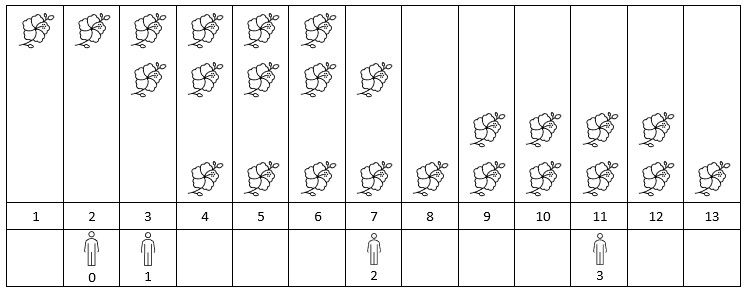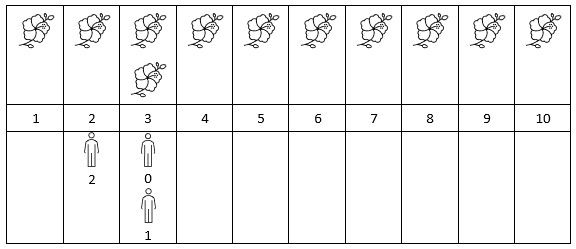Welcome to Subscribe On Youtube
2251. Number of Flowers in Full Bloom
Description
You are given a 0-indexed 2D integer array flowers, where flowers[i] = [starti, endi] means the ith flower will be in full bloom from starti to endi (inclusive). You are also given a 0-indexed integer array people of size n, where people[i] is the time that the ith person will arrive to see the flowers.
Return an integer array answer of size n, where answer[i] is the number of flowers that are in full bloom when the ith person arrives.
Example 1:

Input: flowers = [[1,6],[3,7],[9,12],[4,13]], people = [2,3,7,11] Output: [1,2,2,2] Explanation: The figure above shows the times when the flowers are in full bloom and when the people arrive. For each person, we return the number of flowers in full bloom during their arrival.
Example 2:

Input: flowers = [[1,10],[3,3]], people = [3,3,2] Output: [2,2,1] Explanation: The figure above shows the times when the flowers are in full bloom and when the people arrive. For each person, we return the number of flowers in full bloom during their arrival.
Constraints:
1 <= flowers.length <= 5 * 104flowers[i].length == 21 <= starti <= endi <= 1091 <= people.length <= 5 * 1041 <= people[i] <= 109
Solutions
-
class Solution { public int[] fullBloomFlowers(int[][] flowers, int[] people) { int n = flowers.length; int[] start = new int[n]; int[] end = new int[n]; for (int i = 0; i < n; ++i) { start[i] = flowers[i][0]; end[i] = flowers[i][1]; } Arrays.sort(start); Arrays.sort(end); int m = people.length; int[] ans = new int[m]; for (int i = 0; i < m; ++i) { ans[i] = search(start, people[i] + 1) - search(end, people[i]); } return ans; } private int search(int[] nums, int x) { int l = 0, r = nums.length; while (l < r) { int mid = (l + r) >> 1; if (nums[mid] >= x) { r = mid; } else { l = mid + 1; } } return l; } } -
class Solution { public: vector<int> fullBloomFlowers(vector<vector<int>>& flowers, vector<int>& people) { int n = flowers.size(); vector<int> start; vector<int> end; for (auto& f : flowers) { start.push_back(f[0]); end.push_back(f[1]); } sort(start.begin(), start.end()); sort(end.begin(), end.end()); vector<int> ans; for (auto& p : people) { auto r = upper_bound(start.begin(), start.end(), p) - start.begin(); auto l = lower_bound(end.begin(), end.end(), p) - end.begin(); ans.push_back(r - l); } return ans; } }; -
class Solution: def fullBloomFlowers( self, flowers: List[List[int]], people: List[int] ) -> List[int]: start, end = sorted(a for a, _ in flowers), sorted(b for _, b in flowers) return [bisect_right(start, p) - bisect_left(end, p) for p in people] -
func fullBloomFlowers(flowers [][]int, people []int) (ans []int) { n := len(flowers) start := make([]int, n) end := make([]int, n) for i, f := range flowers { start[i] = f[0] end[i] = f[1] } sort.Ints(start) sort.Ints(end) for _, p := range people { r := sort.SearchInts(start, p+1) l := sort.SearchInts(end, p) ans = append(ans, r-l) } return } -
function fullBloomFlowers(flowers: number[][], people: number[]): number[] { const n = flowers.length; const start = new Array(n).fill(0); const end = new Array(n).fill(0); for (let i = 0; i < n; ++i) { start[i] = flowers[i][0]; end[i] = flowers[i][1]; } start.sort((a, b) => a - b); end.sort((a, b) => a - b); const ans: number[] = []; for (const p of people) { const r = search(start, p + 1); const l = search(end, p); ans.push(r - l); } return ans; } function search(nums: number[], x: number): number { let l = 0; let r = nums.length; while (l < r) { const mid = (l + r) >> 1; if (nums[mid] >= x) { r = mid; } else { l = mid + 1; } } return l; } -
use std::collections::BTreeMap; impl Solution { #[allow(dead_code)] pub fn full_bloom_flowers(flowers: Vec<Vec<i32>>, people: Vec<i32>) -> Vec<i32> { let n = people.len(); // First sort the people vector based on the first item let mut people: Vec<(usize, i32)> = people .into_iter() .enumerate() .map(|x| x) .collect(); people.sort_by(|lhs, rhs| { lhs.1.cmp(&rhs.1) }); // Initialize the difference vector let mut diff = BTreeMap::new(); let mut ret = vec![0; n]; for f in flowers { let (left, right) = (f[0], f[1]); diff.entry(left) .and_modify(|x| { *x += 1; }) .or_insert(1); diff.entry(right + 1) .and_modify(|x| { *x -= 1; }) .or_insert(-1); } let mut sum = 0; let mut i = 0; for (k, v) in diff { while i < n && people[i].1 < k { ret[people[i].0] += sum; i += 1; } sum += v; } ret } }